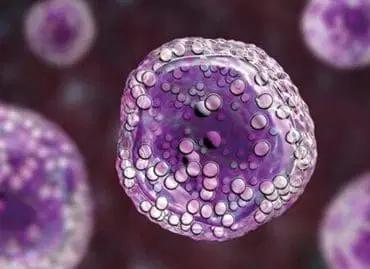- Center on Health Equity & Access
- Clinical
- Health Care Cost
- Health Care Delivery
- Insurance
- Policy
- Technology
- Value-Based Care
A Look at Those With Durable Responses to Epcoritamab in LBCL
A post-hoc analysis of EPCORE-NHL-1 was presented at ASCO.
Patients with large B-cell lymphoma (LBCL) who had complete responses (CR) after 2 years of treatment with subcutaneous epcoritamab (Epklinly, AbbVie/Genmab) were more likely to have lower tumor burden at baseline and had lower baseline ferritin levelsthan those who did not have a CR at 2 years, according to new look at data from the pivotal phase 2 EPCORE-NHL-1 trial. (NCT03625037).1
Follicular lymphoma | Image credit: Follicular lymphoma Foundation

Those who achieved a CR at 2 years also had lower baseline ferritin levels than those who did not have a CR at that point; however, prior treatment with chimeric antigen receptor (CAR) T-cell therapy was similar between the groups, results show. Data were presented in an abstract at the recent American Society of Clinical Oncology (ASCO) annual meeting.1
Epcoritamab, a bispecific T-cell engager targeting CD20 and CD3, has FDA approval to treat patients with follicular lymphoma (FL) who have received at least 2 prior lines of systemic therapy; approval was based on results from the pivotal cohort of EPCORE-NHL-1 that were published in Lancet Haematology.2 Results for an expansion cohort that included broader types of LBCL showed durable CRs.
The ASCO abstract presented long-term results from a post-hoc analysis of 157 patients with LBCL enrolled in EPCORE-NHL-1.1 Treatment with epcoritamab was offered in 28-day cycles, starting with 0.16 mg and 0.8 mg step up doses and working to a 48-mg full doses, which were given once weekly for cycles 1-3, then every 2 weeks for cycles 4-9, and every 4 weeks thereafter until progressive disease or unacceptable toxicity.
After 3 years of follow-up, epcoritamab monotherapy produced a median CR of 36 months, a median progression-free survival (PFS) of of 37 months and overall survival (OS) was not reached in patients who had CR.
The post-hoc analysis compared characteristics for patients who had a CR at the 2-year mark vs those who had not achieved a CR at 2 years. The primary end point was overall response rate (ORR). At the May 3, 2024, data cutoff, 41% (65 patients), had achieved CR, with 32 (49%) maintaining it at the 2-year mark. This group had a mean age of 63 years, with 47% male, and 66% refractory to at least 2 prior lines of therapy.1
Details of the data show:
- 19% of those with a CR at 2 years had lower tumor burden at baseline (bulky disease greater than 7 cm), compared with 34% who did not.
- Lactate dehydrogenase levels were 294 vs 501 U/L for those who achieved at CR at 2 years vs those who did not;
- Patients in CR at 2 years had lower baseline ferritin levels (383 vs 856 mg/L).
- 38% of those with a CR at 2 years had prior CAR-T treatment, compared with 39% for those who did not have a CR at 2 years.
- Safety data were similar for those who did and did not have a CR at the 2-year mark
“Depth and duration of CR correlate with long-term outcomes in LBCL,” the authors concluded. “This novel subgroup analysis of pts with R/R LBCL in CR at 2 [years] after starting epcoritamab highlights long-term disease remission, overall survival, and potential for cure with epcoritamab in some patients,” the authors wrote.
References
- Karimi Y, Vose J, Clausen MR, et al. Novel analysis of 3-y results from the pivotal EPCORE NHL-1 study: Outcomes in patients (pts) with relapsed/refractory large B-cell lymphoma (R/R LBCL) and complete response (CR) at 2 y with epcoritamab (epcor) monotherapy. J Clin Oncol. 2025;43(suppl 16): Abstract 7043.
- Linton KM, Vitolo U, Jurcack W, et al. Epcoritamab monotherapy in patients with relapsed or refractory follicular lymphoma (EPCORE NHL-1): a phase 2 cohort of a single-arm, multicentre study. Lancet Haematol. 2024;11(8): e593 - e605 doi: 10.1016/S2352-3026(24)00166-2.
As Cancer Caregiving Becomes More Complex, Start-Up Offers Solution to Demographic Cliff
February 5th 2026The need for at-home caregivers in cancer care is not new. But as therapies improve, the need to care for patients with cancer stretches over longer periods. Today, the rise of advanced cellular therapies asks more of caregivers. One caregiver who has lived it is working on a better solution for other families.
Read More
